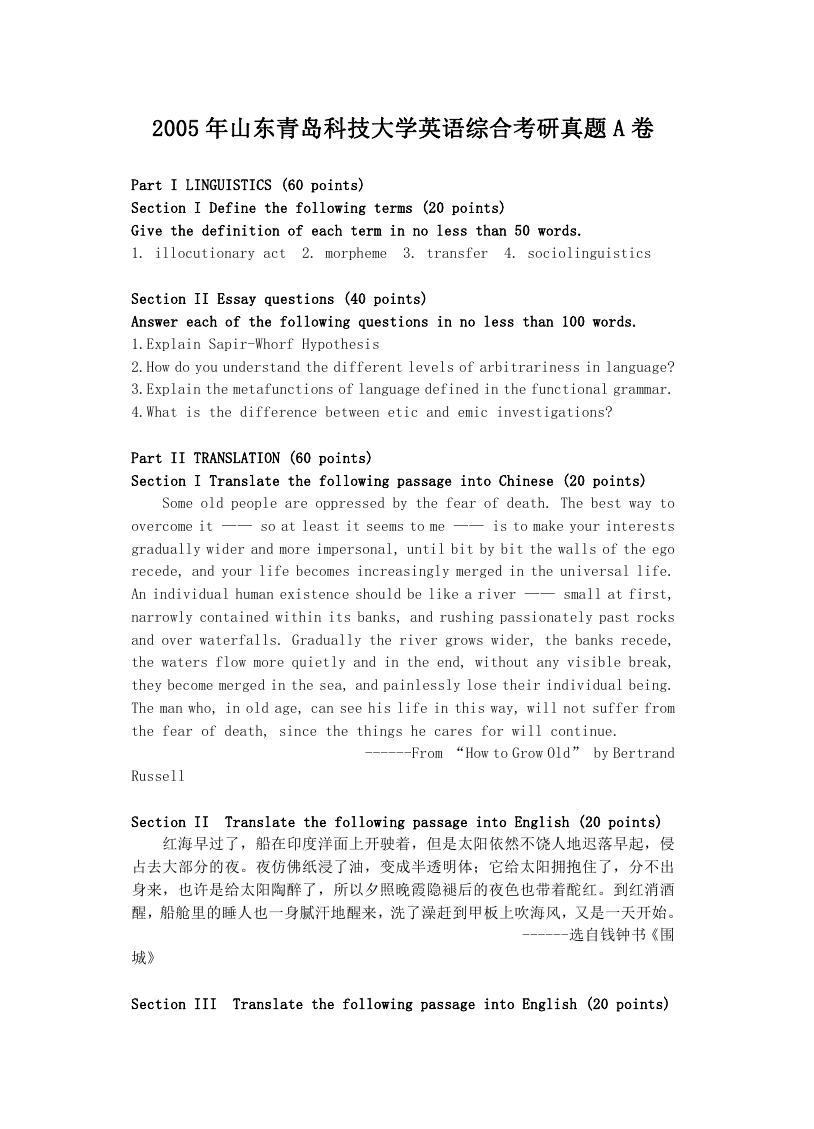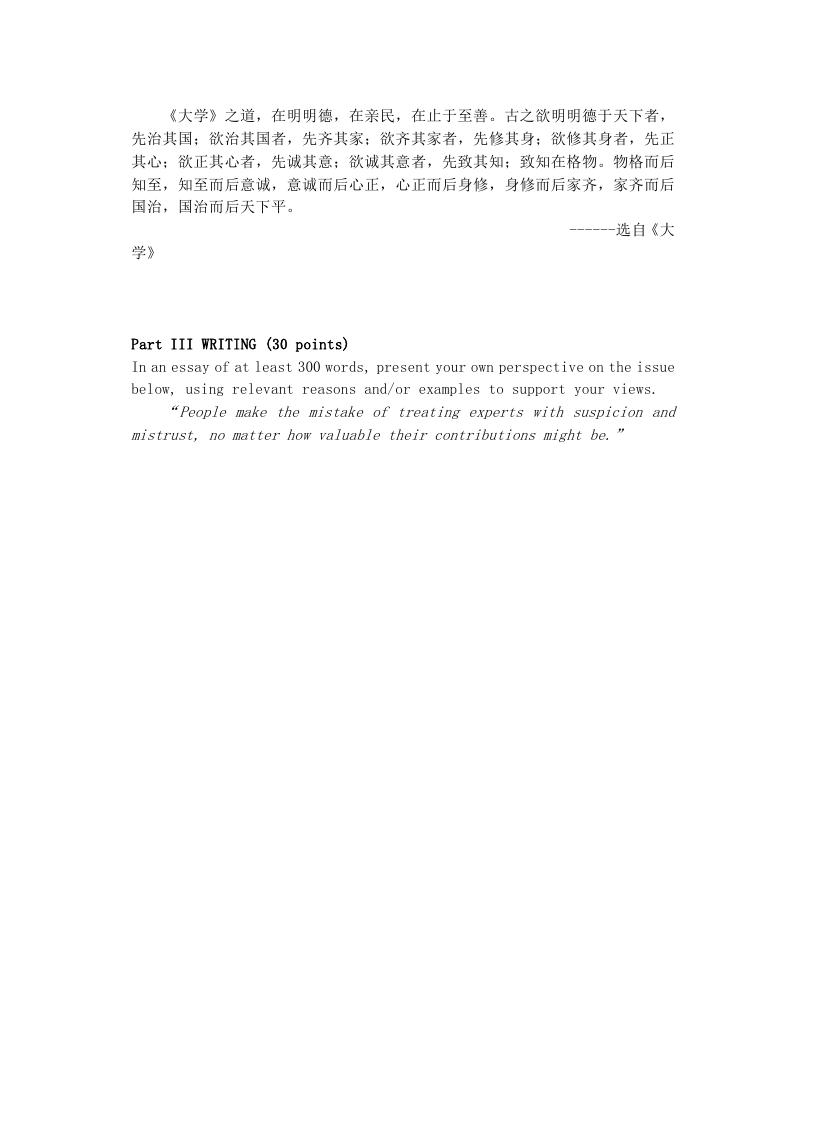2005 年山东青岛科技大学英语综合考研真题 A 卷
Part I LINGUISTICS (60 points)
Section I Define the following terms (20 points)
Give the definition of each term in no less than 50 words.
1. illocutionary act
2. morpheme
3. transfer
4. sociolinguistics
Section II Essay questions (40 points)
Answer each of the following questions in no less than 100 words.
1.Explain Sapir-Whorf Hypothesis
2.How do you understand the different levels of arbitrariness in language?
3.Explain the metafunctions of language defined in the functional grammar.
4.What is the difference between etic and emic investigations?
Part II TRANSLATION (60 points)
Section I Translate the following passage into Chinese (20 points)
Some old people are oppressed by the fear of death. The best way to
overcome it —— so at least it seems to me —— is to make your interests
gradually wider and more impersonal, until bit by bit the walls of the ego
recede, and your life becomes increasingly merged in the universal life.
An individual human existence should be like a river —— small at first,
narrowly contained within its banks, and rushing passionately past rocks
and over waterfalls. Gradually the river grows wider, the banks recede,
the waters flow more quietly and in the end, without any visible break,
they become merged in the sea, and painlessly lose their individual being.
The man who, in old age, can see his life in this way, will not suffer from
the fear of death, since the things he cares for will continue.
------From “How to Grow Old” by Bertrand
Russell
Section II
Translate the following passage into English (20 points)
红海早过了,船在印度洋面上开驶着,但是太阳依然不饶人地迟落早起,侵
占去大部分的夜。夜仿佛纸浸了油,变成半透明体;它给太阳拥抱住了,分不出
身来,也许是给太阳陶醉了,所以夕照晚霞隐褪后的夜色也带着酡红。到红消酒
醒,船舱里的睡人也一身腻汗地醒来,洗了澡赶到甲板上吹海风,又是一天开始。
------选自钱钟书《围
城》
Section III
Translate the following passage into English (20 points)
�
《大学》之道,在明明德,在亲民,在止于至善。古之欲明明德于天下者,
先治其国;欲治其国者,先齐其家;欲齐其家者,先修其身;欲修其身者,先正
其心;欲正其心者,先诚其意;欲诚其意者,先致其知;致知在格物。物格而后
知至,知至而后意诚,意诚而后心正,心正而后身修,身修而后家齐,家齐而后
国治,国治而后天下平。
------选自《大
学》
Part III WRITING (30 points)
In an essay of at least 300 words, present your own perspective on the issue
below, using relevant reasons and/or examples to support your views.
“People make the mistake of treating experts with suspicion and
mistrust, no matter how valuable their contributions might be.”
�




 2023年江西萍乡中考道德与法治真题及答案.doc
2023年江西萍乡中考道德与法治真题及答案.doc 2012年重庆南川中考生物真题及答案.doc
2012年重庆南川中考生物真题及答案.doc 2013年江西师范大学地理学综合及文艺理论基础考研真题.doc
2013年江西师范大学地理学综合及文艺理论基础考研真题.doc 2020年四川甘孜小升初语文真题及答案I卷.doc
2020年四川甘孜小升初语文真题及答案I卷.doc 2020年注册岩土工程师专业基础考试真题及答案.doc
2020年注册岩土工程师专业基础考试真题及答案.doc 2023-2024学年福建省厦门市九年级上学期数学月考试题及答案.doc
2023-2024学年福建省厦门市九年级上学期数学月考试题及答案.doc 2021-2022学年辽宁省沈阳市大东区九年级上学期语文期末试题及答案.doc
2021-2022学年辽宁省沈阳市大东区九年级上学期语文期末试题及答案.doc 2022-2023学年北京东城区初三第一学期物理期末试卷及答案.doc
2022-2023学年北京东城区初三第一学期物理期末试卷及答案.doc 2018上半年江西教师资格初中地理学科知识与教学能力真题及答案.doc
2018上半年江西教师资格初中地理学科知识与教学能力真题及答案.doc 2012年河北国家公务员申论考试真题及答案-省级.doc
2012年河北国家公务员申论考试真题及答案-省级.doc 2020-2021学年江苏省扬州市江都区邵樊片九年级上学期数学第一次质量检测试题及答案.doc
2020-2021学年江苏省扬州市江都区邵樊片九年级上学期数学第一次质量检测试题及答案.doc 2022下半年黑龙江教师资格证中学综合素质真题及答案.doc
2022下半年黑龙江教师资格证中学综合素质真题及答案.doc